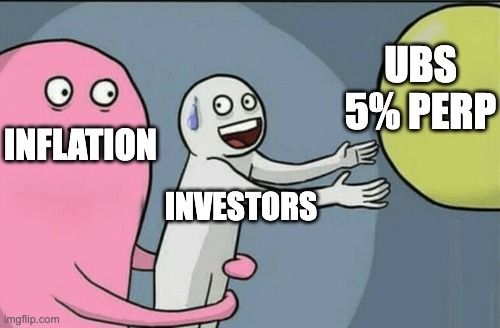UBS 5% PERP at 10.6%?

I came across this tweet and thought getting paid 10.6% from UBS is not a bad deal at all! But what exactly is a perpetual bond, and why are banks happy to offer such high yields? Let's unpack it:
Speaking of debit Suisse...see the UBS 5 perp (CH0400441280) trading @ 10.6%? Market thinks they won't call?
— Simon Ree (@simon_ree) April 28, 2022
Perpetual bonds are bonds with no maturity date. While they are not redeemable, they pay a steady stream of interest forever. (Btw, issuers tend to add an option to make the bonds callable.) In this sense, perps resemble equity more than debt.
The interest payments on perps are somewhat similar to stock dividends in that they provide regular payments that contribute to profits. A key difference is that interest payments are typically fixed, while stock dividends can change.
Banks issue perpetual bonds to meet their long term capital requirements. Due to their quasi-equity features, perps are categorised as Tier 1 capital instruments, which form the core capital held in a bank's reserves:

Since you're exposed to the issuer's credit risk forever, perps offer higher yields. Another big risk for investing in perps is inflation. The fixed interest payments you received may not be so attractive in periods of high inflation, which we may very well be entering now.
If the long-term interest is trending well beyond 5%, I don't see why UBS would call on this bond. Perhaps this is what the market is thinking at the moment. Let's observe what banks do with their perps in the coming months.
This was my 5th post (out of five) for #ship30for30!
